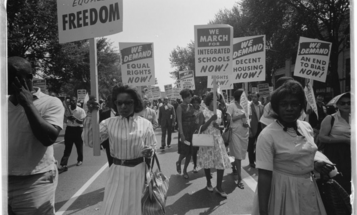
Black Business Leaders Stand Up Against Voter Suppression: Corporate Power Still Threatens Democracy
Corporate America took a stand for equality and democracy against the state of Georgia. Yet, the unbalanced economic system they’re part of creates an opportunity to reassess corporate power in our society.

“As African-American business executives, we don’t have the luxury of being bystanders to injustice,” Kenneth C. Frazier, Chairman and CEO of the pharmaceutical giant Merck, told the New York Times. “We don’t have the luxury of sitting on the sidelines when these kinds of injustices are happening all around us.”
The law is among the first of more than 360 voter suppression bills now pending in states across the country.
The injustice at stake was a harsh set of new voting restrictions enacted by the state of Georgia, which will particularly suppress the rights of Black voters who turned out in record numbers to elect President Biden and 2 Democratic senators. The law is among the first of more than 360 voter suppression bills now pending in states across the country.
On March 31, Frazier, 1 of only 3 Black chief executives currently at the nation’s 100 top-grossing companies, led more than 70 Black business leaders in an open letter denouncing the Georgia law as “undemocratic and un-American” and calling on “colleagues in corporate America to join us in taking a non-partisan stand for equality and democracy.” On April 14, they were joined by hundreds of major corporations and business leaders in a second statement in support of voting rights.
So far, the corporate mobilization has had mixed results. Major League Baseball relocated its 2021 All-Star Game and annual draft out of Atlanta in protest over the law, while Will Smith pulled a film production out of the state. Georgia-based voting rights leader Stacey Abrams has urged companies not to boycott the state but instead to “stay and fight,” by speaking out against voter suppression bills in states where they are still being debated; curtailing campaign contributions to state legislators who sponsor anti-democratic bills; and putting their weight behind vital federal voting rights legislation including the For the People Act and the John Lewis Voting Rights Advancement Act.
The effort to mobilize business leaders highlights both the promise and the limits of corporate action.
The effort to mobilize business leaders highlights both the promise and the limits of corporate action. One the one hand, corporate diversity efforts, while continuing to fall woefully short, have empowered Black executives to shift corporate policy, at least guiding firms to recognize that their bottom line may be at stake when consumers, investors, employees, and prospective corporate recruits increasingly want to see companies take a principled stand on critical issues.
Yet even as they speak out for the most basic rights in our political democracy, the nation’s largest firms continue to preside over a profoundly undemocratic economy. The economic system concentrates power and wealth in a few predominantly white hands, as Black and brown workers disproportionately confront unequal employment opportunities and discriminatory pay, and Black and brown consumers face unfair pricing for essential goods from auto insurance to housing. Many of the same companies voicing their support for democratic values have acted to suppress their own workers’ efforts to stand together for more say in the workplace—from Amazon’s recent moves to crush a union organizing drive by predominantly Black employees at an Alabama warehouse to Google’s actions to crack down on workers’ internal discussions and hire anti-union consultants.
What’s more, corporations spend billions of dollars a year in federal, state, and local campaign contributions and lobbying, promoting corporate priorities on economic issues from taxes to anti-discrimination laws, to the minimum wage in ways that effectively mute the voices of Black and brown citizens even when they can fully exercise the right to vote.
Ironically, it is this power over campaign contributions that may offer the greatest potential leverage against the new wave of anti-democratic state legislation. It certainly seems to be alarming Senate Minority Leader Mitch McConnell, who threatened companies with “serious consequences” if they continued to speak out in favor of voting rights. Yet McConnell, who personally accepted $4.3 million in corporate contributions in 2019 to 2020 in addition to funds aimed at holding a Republican majority in the Senate, may have realized that his own political power comes directly from corporate donors: The Senator quickly backtracked and said that corporations are “certainly entitled to be involved in politics.”
Yet corporations from Toyota to AT&T are already backing out of their pledges, as online activist group Color of Change is exposing.
Corporate pledges to redirect funding away from anti-democratic politicians, while encouraging, are not always dependable. After the failed white supremacist insurrection at the U.S. Capitol on January 6, major companies committed to stop contributing to members of Congress who incited the riot and tried to overthrow the election and the will of Black voters. Yet corporations from Toyota to AT&T are already backing out of their pledges, as online activist group Color of Change is exposing.
The question of corporate action around voting rights creates an opportunity to reassess corporate power in our society. It’s tempting to look to companies as saviors because they wield tremendous influence. Kenneth Frazier and the Black business leaders who stood with him are to be lauded for mobilizing corporate America against voter suppression laws, giving citizens and activists another tool to protect democracy. At the same time, concentrated corporate power is a major part of what makes both our politics and our economy so undemocratic. We can’t allow corporations to determine how much democracy we are permitted to exercise.
Thanks to Shruti Banerjee for her intellectual partnership and contributions to this piece.




